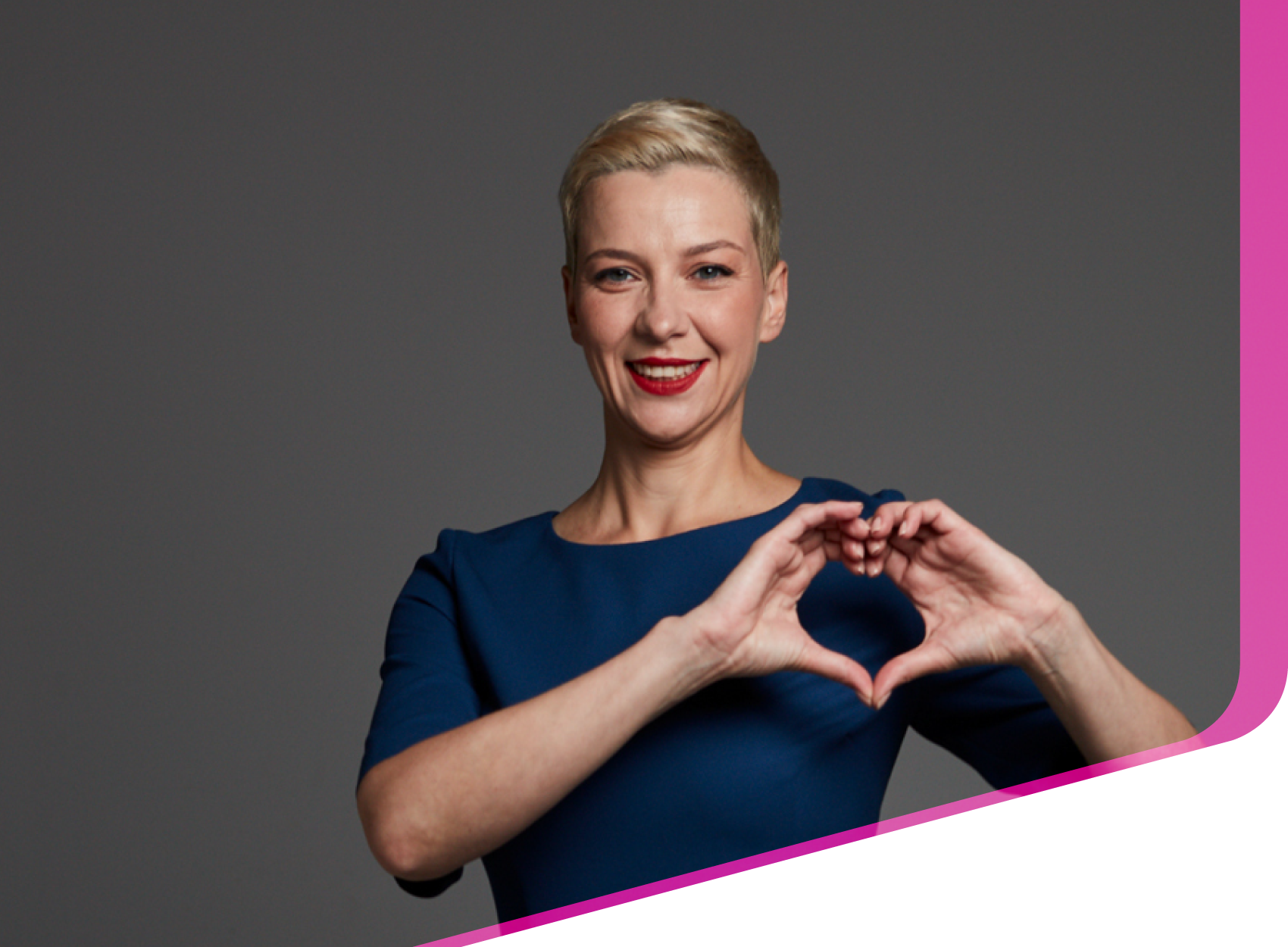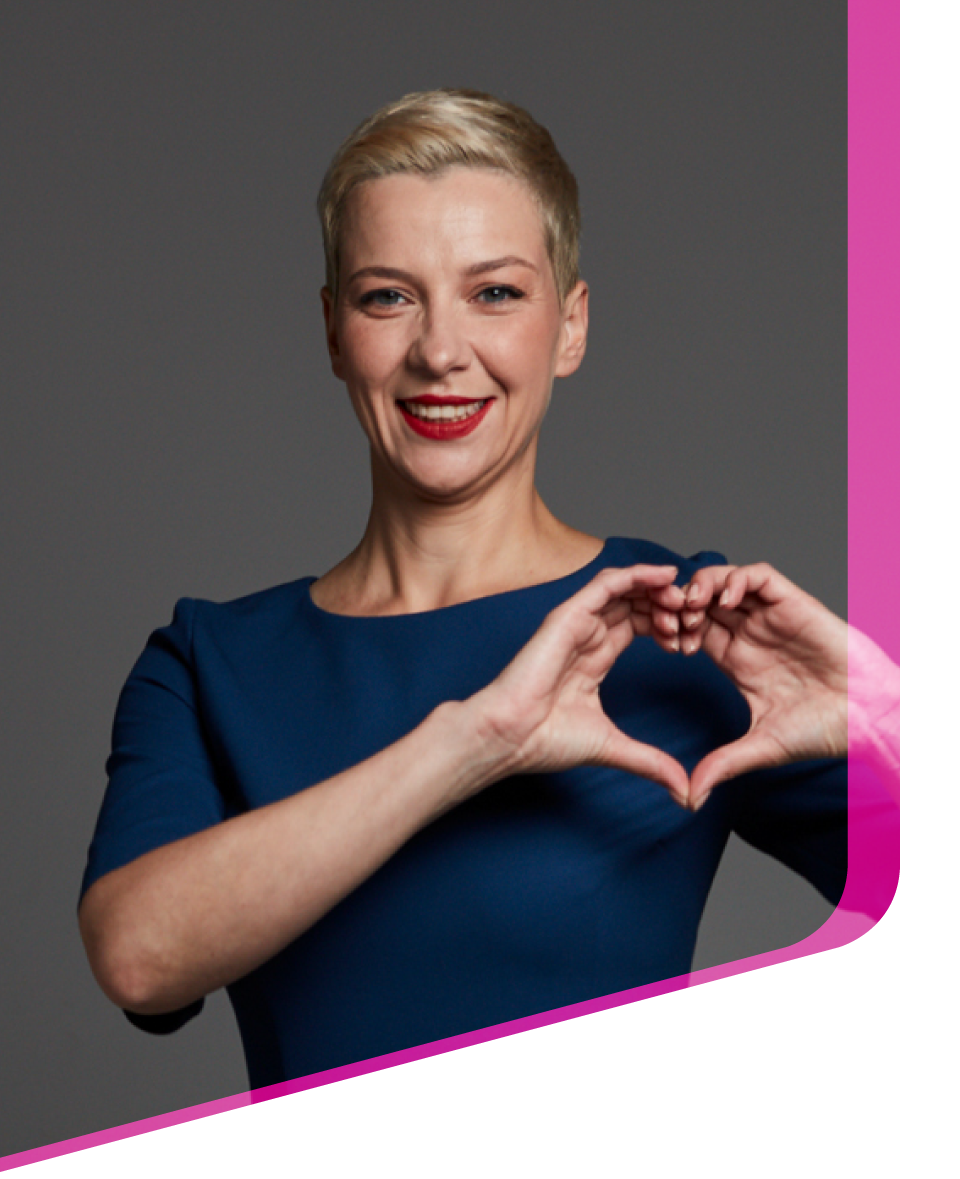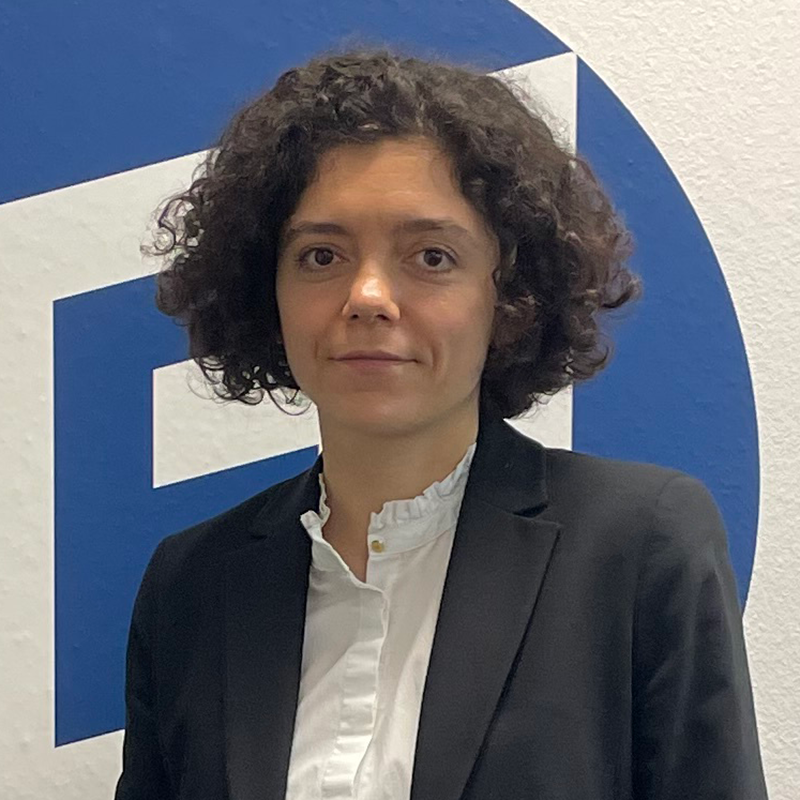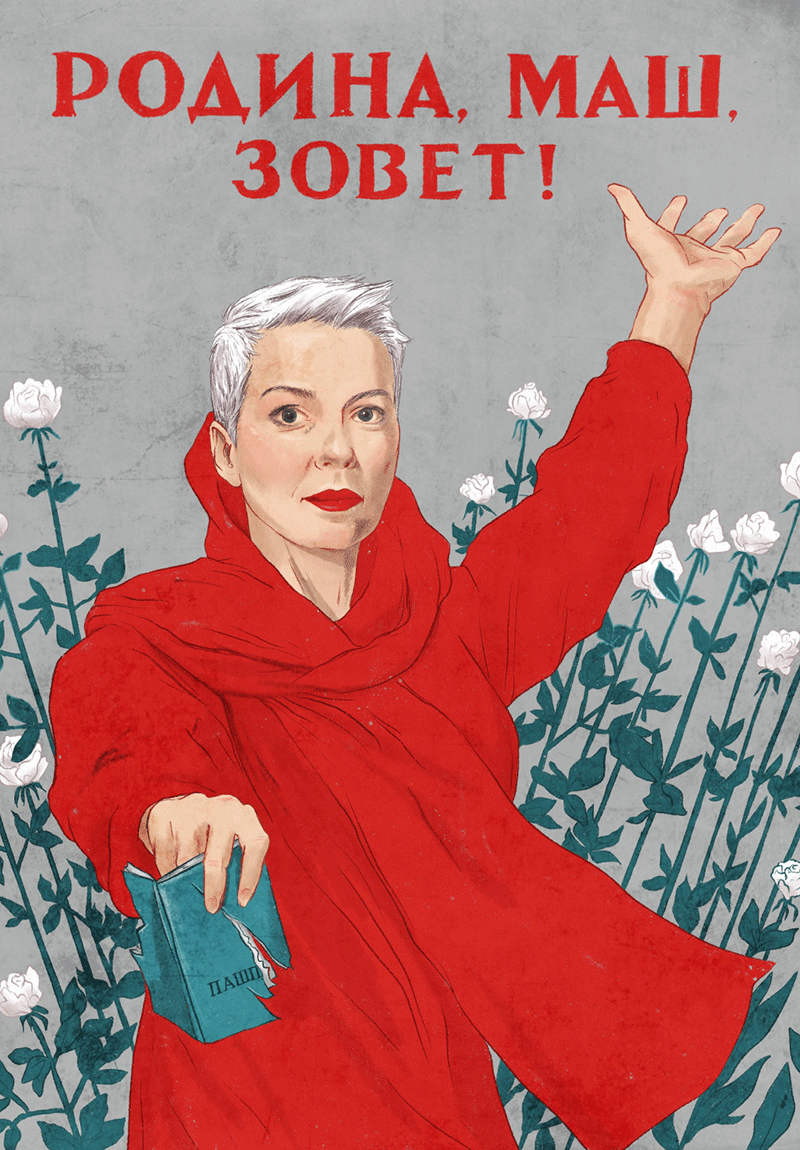
Belarus
Belarus
Belarus
Maria Kalesnikava
Maria Kalesnikava
Maria Kalesnikava
Freedom Fighter
Freedom Fighter
Freedom Fighter

Belarus
Maria Kalesnikava
Freedom Fighter
Belarusian freedom fighter Maria Kalesnikava was awarded the Gerhart and Renate Baum Foundation's Human Rights Prize. In his laudatory speech, Gerhart Baum, said the following:
“Let us encourage Maria Kalesnikava and her fellow campaigners: Don't give up! Let us strengthen them through our solidarity. Let us fight for their release from prison.“

VITA
Tatsiana Khomich is a human rights activist, the sister of imprisoned freedom fighter and artist Maria Kalesnikava. Tatsiana is a co-founder of Association “FreeBelarusPrsioners” of relatives and former political prisoners, member of the Coordination Council of Belarus, the exiled “counter-government” founded by Svetlana Tikhanovskaya. Today, she is pushing for humanitarian advocacy for the release of political prisoners in Belarus. Campaigns such as Release Now have been successfully launched.
Following Maria's arbitrary detention, the Friedrich Naumann Foundation launched a focus on human rights defenders with Gerhart Baum. This is the fifth edition of the publication. It is time to speak with Tatjana again and remember Maria's fate.
Since our first interview with you, Maria has received a sentence. How is she doing?
In September 2021, after a closed-door trial, Maria was sentenced to 11 years in prison on politically motivated charges of “conspiracy to seize power,” “creating and extremists formation,” and "threatening national security”. The trial was widely condemned by the international community as a blatant violation of human rights and the rule of law. Her case is one of thousands, where the regime brutally punished those who spoke for fair elections, against violence and repression. Since 2022 Maria has been held in a women’s colony in Gomel.
At the end of 2022, she was placed in a punishment cell, only 3m² for 10 days. It was freezing, and Maria survived by constantly walking to keep warm. She lost consciousness several times, suffered high blood pressure and nausea. Her complaints were ignored. Soon after, she was hospitalized for emergency surgery caused by a perforated ulcer and peritonitis. She spent weeks recovering but was quickly returned to prison instead of being allowed long-term treatment in the hospital. She lost 15 kg within weeks and barely survived.
In February 2023, all communication with the family stopped. For more than 18 months she was kept in solitary confinement in a cell-type chamber, allowed only 30 minutes outside per day, with no letters or phone calls. We managed to find out that by mid 2024 her health drastically worsened: her weight dropped to 45 kg. She was basically starving because of her ulcer, inability to eat food provided by the colony and was not allowed to receive food parcels or medications from family. In November 2024, our father was allowed a short visit. Maria looked stronger; since October 2024 she has reportedly received better medical treatment and nutrition. Later in November 2024, Maria was transferred out of solitary into a squad with other women. She is now working in a sewing factory in the colony, which at least allows her limited social contact. Still, she remains under strict surveillance. Communication is still blocked: no letters, no phone calls, no further family visits, and no access to a lawyer. During these years four of Marias’ lawyers were disbarred. Today she has no legal representation, as happens with many high-profile political prisoners in Belarus.
Which activities do you push forward in order to support the Political Prisoners in Belarus?
The first is humanitarian advocacy. This means working with governments, the EU, the US, and international organizations to promote active diplomacy and humanitarian negotiations on the release of political prisoners. Together with human rights defenders and colleagues in the Coalition for the Release of Political Prisoners, where I work alongside with Valery Kavaleuski, a former Belarusian diplomat, now Director of EEEA, and Volha Harbunova, who is an anti-domestic violence activist and former political prisoner, we prioritize the release of vulnerable groups: the seriously ill, the elderly, minors, parents of minors, people with disabilities etc. Today there are more than 200 such cases, many of them behind bars for several years.
Belarusian prisons differ greatly from Western European ones. Many of them have survived from Soviet times – both regarding the infrastructure and the rules. Political prisoners there face special discrimination on political grounds: systematic violence, restrictions on contact with their families, denial of adequate medical care, even compared to other prisoners. We know of at least 13 deaths of political prisoners in detention or shortly after release – all of which could have been prevented with timely medical assistance. At the same time, we have seen how releases literally saved lives: people were able to undergo urgent and life-saving treatment once they were freed.

How many people have been released because of humanitarian advocacy?
Thanks to diplomatic efforts over the past year, more than 350 people have been released, including through pardons and exchanges. Among those pardoned were people from vulnerable groups – the sick, the elderly, parents of many children, and people with disabilities. Pardons were a signal of readiness for such negotiations to release political prisoners, though it is a slow process. Thanks to the diplomatic efforts of the United States, 20 people have been released since the beginning of 2025. This is the only working negotiating track for the release of political prisoners. We call on EU countries to support it and activate their own humanitarian negotiations. For example, in the 2023 resolution of the German Bundestag, the release of political prisoners was identified as a priority. But if it remains only on paper, without action, it has no real effect. A while ago, no one expected that one of the famous political prisoners, like Siarhei Tsikhanovsky, could be released, but now it has become a reality.
How do you keep the international community and politicians informed?
In May 2025, we launched a manifesto calling on democratic states and the Belarusian authorities to engage in humanitarian negotiations to release political prisoners. This approach is shared by all Belarusian human rights organizations. Today, it has grown into the international campaign ReleaseNow, whose core message is simple: Resolutions and words of solidarity are not enough – what is needed are concrete actions that lead to the liberation of people.
The campaign unites organizations, former prisoners, families, and international partners around one urgent goal: to secure the release of all political prisoners. We run media and social media campaigns, organize actions and events to keep political prisoners at the center of international attention.
Minsk has learned to live in isolation and under sanctions. Hundreds of calls for the “immediate and unconditional release” of all political prisoners have become background noise to which the authorities are accustomed. What works are only concrete steps – diplomatic signals, negotiations, incentives, concessions, and room for maneuver.
The third direction is support for families of political prisoners. Together with other families, we founded the association FreeBelarusPrisoners. We build a community of support so that no one is left alone with their pain. This is especially important for surviving these difficult years – a difficult time for all of us.
My goal is to ensure that my sister and all political prisoners are released as soon as possible, to support their families, and to make sure that the issue of political prisoners remains on the international agenda until the last of them is free.
With the support of the FNF Human Rights Hub, you and others have submitted a so called stakeholder report about the situation of Political Prisoners in Belarus to the United Nations in Geneva. Why is this engagement with the UN important for your work?
Submitting a stakeholder report to the United Nations in Geneva is a very important part of our work this year. It allows our coalition on the release of political prisoners to present well-documented and independent information about the situation of political prisoners in Belarus, especially about the most vulnerable groups – the seriously ill, the elderly, minors, women, and people with disabilities.
But we also go further. In our report we raised not only the problems, but also practical steps and recommendations from our side about the options and paths that might lead to progress. We also underlined the importance of the possible visit of the UN High Commissioner for Human Rights to Belarus, and the need to strengthen constructive engagement with OHCHR – including taking practical humanitarian measures for individuals from vulnerable groups who are in detention and urgently need medical care.
This engagement with the UN has already created opportunities for our coalition to move forward. On the basis of our stakeholder report, we organized and held a number of briefings with the participation of the EU states, as well as the US, Iceland, Canada, Australia and the UK. There we could highlight our recommendations, emphasize the urgency of releases, and discuss how states can support humanitarian negotiations that actually save lives. For us, this cooperation with the UN is not only about raising awareness, but also about opening practical channels for humanitarian progress.
Belarus
